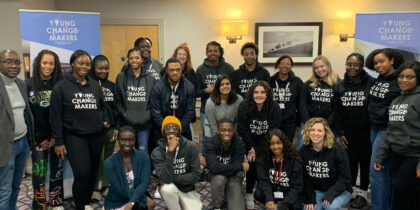By Dotun Busari and Ashleigh Onabajo
Not So Micro are a youth-led social action group created as part of the Changemakers programme. We are part of the Changes to Public Policy strand and our aim as a group is to see mandatory racism and microaggression components in the teacher training framework.
We are currently aiming to achieve this by raising awareness on social media and engaging with people who could be beneficial in bringing our cause to life. The other social action strands from Changemakers are engaging frontline practitioners, wider public behaviours and attitudinal changes, and peer-to-peer outreach and support. Not So Micro currently consists of Dotun Busari, Ashleigh Onabajo, Paul Taiwo and Melvin Riley.
Microaggressions are defined as subtle, daily, and unintentional racial slights committed against people of colour because they are members of a racialised group. To put it simply, it is the off-hand comments or actions that are seen as small and insignificant, but have a lasting impact on the individuals from racialised communities. Research suggests that there is a significant correlation between experiencing racial microaggressions and depressive symptoms, which is why it is important to address the fact that young people are exposed to them in education as soon as possible.
The stress that can be experienced from being a victim of microaggressions can also have long-term impacts on anxiety, PTSD, psychological wellbeing and self-esteem. Research even goes as far to suggest that experience of microaggressions can result in increased suicide ideation, which is why it is so important to acknowledge that microaggressions are not “micro” in the long-term effects they can have on individuals from racialised communities.
The white paper, entitled Opportunity for all, sets out how the Government is planning to improve school education in England. It includes proposals about teacher training and the quality of teaching, academy status and support for children with Special Educational Needs and Disabilities (SEND). There is also reference to mental health and wellbeing at school, mostly focused on existing initiatives such as Mental Health Support Teams (MHSTs) and the designated senior leads. There are sections also on attendance and behaviour, which are currently the subject of separate consultations.
We believe that this white paper is a missed opportunity to make the link between disadvantage in education and teacher training and skills by addressing racism and microaggressions. There’s no mention of discrimination or racism despite their importance to young people’s experiences, wellbeing and attainment. Mental health scarcely appears in the white paper, and when it does appear it doesn’t mention any action that brings about a whole school approach to mental health and wellbeing. This is left to MHSTs, which are commissioned by the NHS. We have learnt from a recent Race and Health Observatory report that mental health services are not doing the job they should for children from racialised communities, so the most disadvantaged children will likely slip through the cracks.
No connections are made in the white paper between disadvantaged children’s mental health, and how schools could be doing more. It also misses the chance to acknowledge that tackling racism and discrimination is every member of staff’s responsibility, and should play a large role in whole school approaches to mental health and wellbeing. There is in fact little mention of racial discrimination beyond disadvantaged students which encompasses so many different groups of students. Training that isn’t tailored to tackling particular gaps in knowledge will be ineffective in the long-term, and could be a waste of money.
The white paper states that ‘We have strengthened schools’ approaches to safeguarding and wellbeing, improving statutory guidance, introducing compulsory relationships, sex and health education and strengthening the role of Designated Safeguarding Leads’. The effects of racism and racial (micro)aggressions are also key elements of safeguarding and wellbeing, yet they are not included in this new update.
The white paper also says that ‘The quality of teaching is the single most important in-school factor in improving outcomes for children, especially those from disadvantaged backgrounds’. Whilst the quality of teaching is important, the quality of support provided for children from disadvantaged backgrounds is equally important. We believe that the impact a school’s teaching quality can have on a child can be enhanced by the implementation of greater emotional and psychological support, especially for children from disadvantaged backgrounds. Specifically, racial trauma and microaggression support for young people. Excellent teaching is essential, but the race-related pain and trauma induced alongside this may undermine the Government’s ‘excellent teaching’ regime.
Our group propose training on microaggressions and racism for all school staff. Research by the Runnymede Trust finds that racial literacy needs to be at the heart of teacher training, and the white paper missed the mark by not including this in the new training framework.
Schools could also have in-house support for children who have experienced racism and aggression – such as a counsellor with specific training or a peer group. Having early interventions present can save children from long-term mental health issues, and save NHS spending on mental health services.
Finally, the relationships, sex and health education (RSHE) curriculum can provide teaching opportunities about racism and mental health. Yet recent guidance on the school curriculum denies children the chance to learn about Black History. The lack of Black education in the curriculum can be alienating to a Black student and have negative effects on their self-esteem and subsequently their mental health. There is no reason to limit teachers and students from discussing Black Lives Matter by calling it partisan politics, and there is no excuse to neglect Black and other students from racialised communities in a paper that is supposed to set out aims to improve their education.
The white paper fails to address how the Department for Education plans to equip schools to tackle racism and discrimination, while the earlier guidance limits students and teachers from being able to have well-rounded discussions about these topics. It is disappointing to see a lack of regard for the impact of racism on children’s mental wellbeing. It misses an opportunity to serve children from disadvantaged or ethnic minority backgrounds, the very demographic it seemingly seeks to serve.








